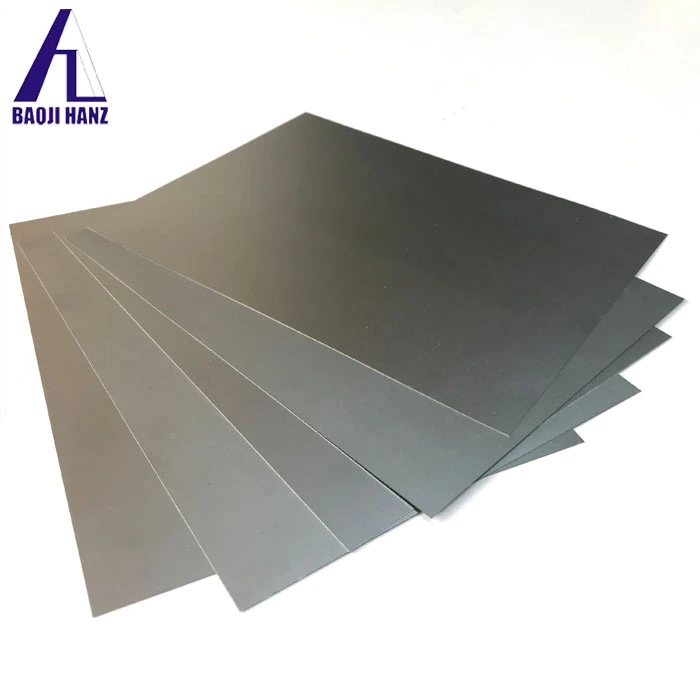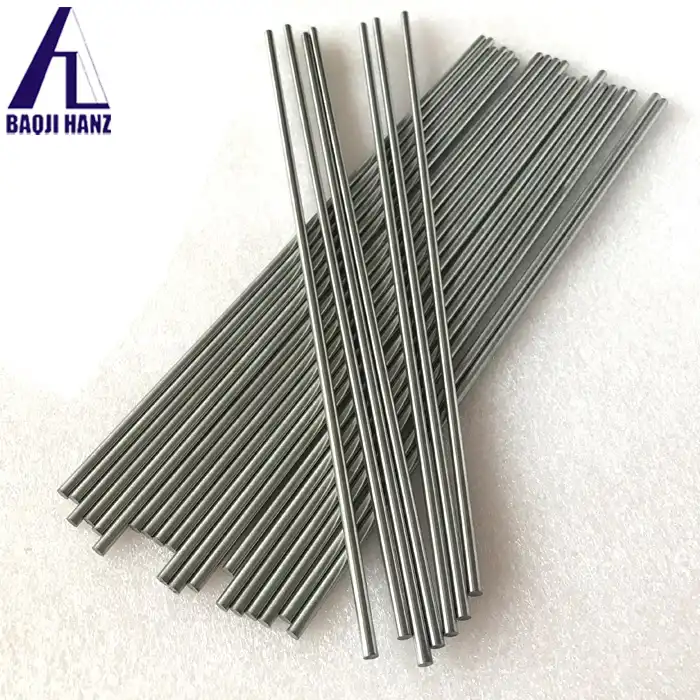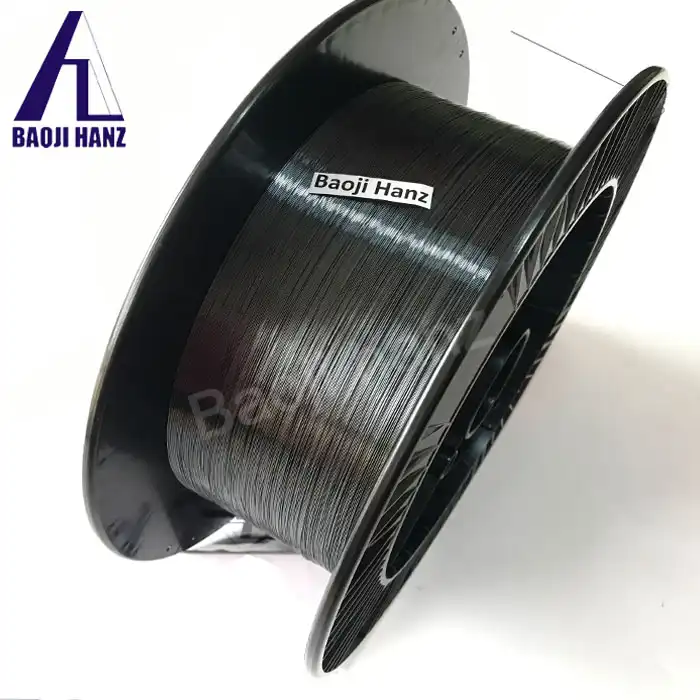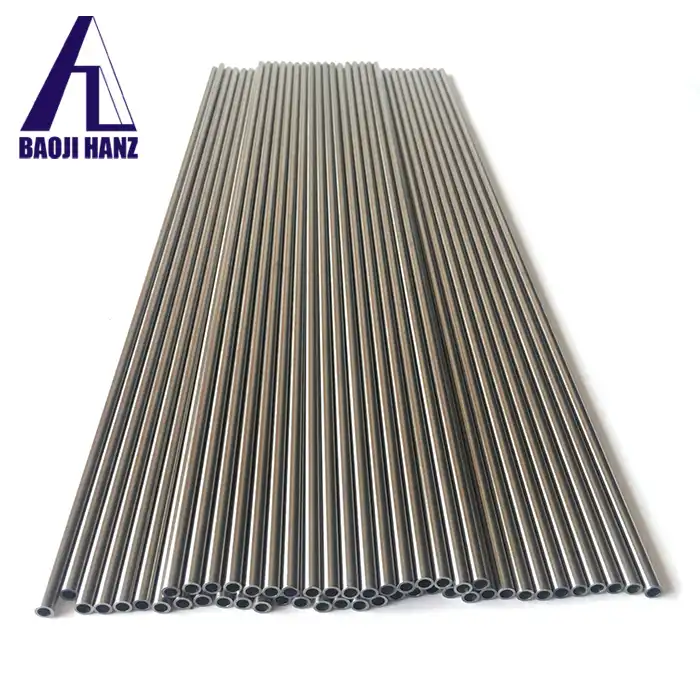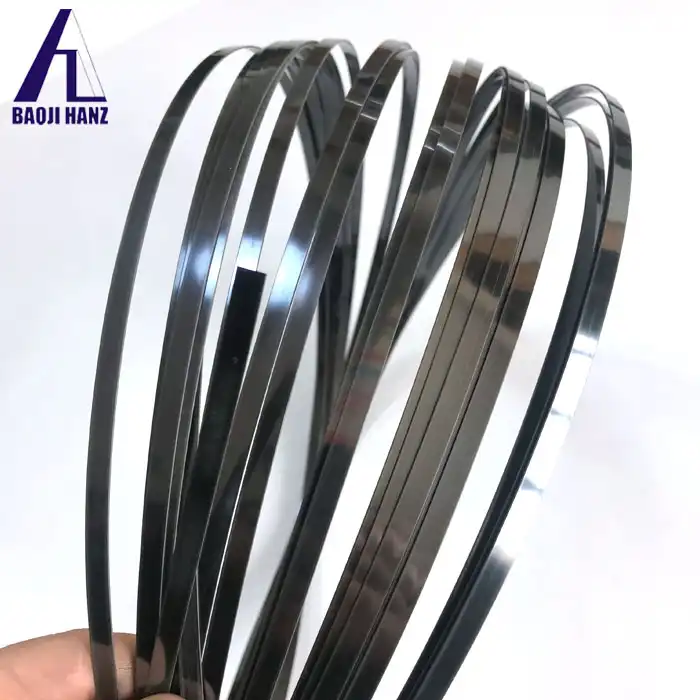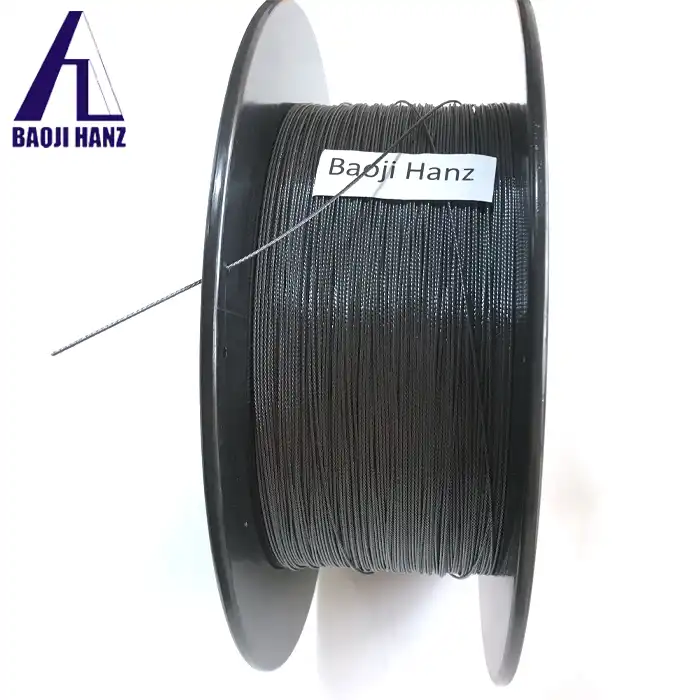What are the advantages of using Nitinol drive wires in mechanical systems?
2025-04-14 21:10:19
The integration of advanced materials into mechanical systems has revolutionized engineering possibilities, and few materials have made as significant an impact as Nitinol drive wires. These remarkable components, crafted from nickel-titanium alloys, offer unprecedented capabilities in mechanical applications due to their unique shape memory and superelastic properties. Nitinol drive wires can undergo substantial deformation and return to their predetermined shape, either through mechanical unloading or temperature changes, providing engineers with innovative solutions for complex mechanical challenges across various industries including medical, aerospace, robotics, and automotive applications.
Unique Material Properties That Transform Mechanical Design
The fundamental advantages of Nitinol drive wires stem from their exceptional material properties that simply cannot be matched by conventional engineering materials. These properties enable innovative designs and superior performance in mechanical systems where traditional materials would fail.
Shape Memory Effect: A Revolutionary Mechanical Property
Nitinol drive wires exhibit a remarkable phenomenon known as the shape memory effect, which fundamentally transforms how engineers approach mechanical actuation systems. This property allows the material to "remember" a predetermined shape and return to it when subjected to specific temperature conditions, even after substantial deformation. The shape memory effect occurs due to a solid-state phase transformation between two crystal structures: martensite (low-temperature phase) and austenite (high-temperature phase). When a Nitinol drive wire is deformed in its martensitic state, it can maintain this deformation until heated above its transformation temperature, at which point it recovers its original austenitic shape with considerable force. This unique capability enables engineers to design mechanical systems with built-in actuation mechanisms that require no external motors or complex gear assemblies. For instance, a simple Nitinol drive wire can generate pulling forces of several newtons when heated, making it ideal for applications requiring compact, reliable actuation solutions. According to industry standards such as ASTM F2063, high-quality Nitinol drive wires manufactured by companies like Baoji Hanz Metal Material Co., Ltd. can endure thousands of transformation cycles without significant degradation in performance, offering excellent reliability in long-term mechanical applications where repeated shape changes are required. This property has been particularly transformative in medical devices, where Nitinol drive wires enable the creation of self-expanding stents and guidewires that can navigate complex anatomical pathways with minimal invasiveness.
Superelasticity: Unprecedented Flexibility and Resilience
The superelastic property of Nitinol drive wires represents another fundamental advantage that dramatically expands design possibilities in mechanical systems. Unlike conventional elastic materials that follow Hooke's Law with limited recoverable strain, Nitinol drive wires can undergo deformation of up to 8-10% strain and completely recover their original shape upon unloading, which is approximately ten times the elastic limit of stainless steel. This extraordinary elasticity results from a stress-induced phase transformation rather than conventional elastic deformation. When stress is applied to a superelastic Nitinol drive wire at temperatures above its austenite finish temperature, it transforms from austenite to martensite, accommodating large strains without permanent deformation. Upon removal of the stress, the material reverts to its austenitic structure and original shape. This property makes Nitinol drive wires exceptionally suited for applications requiring extreme flexibility, kink resistance, and durability under cyclic loading conditions. For mechanical systems that must navigate tight spaces or withstand repeated bending and twisting, such as robotics or minimally invasive medical instruments, Nitinol drive wires manufactured to ISO13485:2016 standards provide unparalleled performance advantages. With a composition typically featuring a minimum of 55% nickel and 45% titanium, these wires deliver consistent mechanical behavior across a wide range of operating conditions. The superelasticity of Nitinol drive wires also results in a unique stress-strain plateau that provides constant force over a wide displacement range, enabling the design of mechanical systems with built-in force-limiting capabilities that protect delicate components or tissues.
Fatigue Resistance and Durability: Extending Mechanical Lifespan
The exceptional fatigue resistance of Nitinol drive wires represents a critical advantage for mechanical systems subject to repeated cycles of stress or deformation. Unlike conventional engineering metals that gradually accumulate microstructural damage leading to fatigue failure, properly processed Nitinol drive wires can withstand millions of deformation cycles without failure when operated within their superelastic range. This remarkable durability stems from the material's unique stress-induced martensitic transformation mechanism, which accommodates strain without the typical dislocation movement and accumulation that leads to fatigue crack initiation in conventional metals. For mechanical applications requiring long-term reliability, such as actuators in aerospace systems or continuously flexing components in medical devices, this fatigue resistance translates directly to extended service life and reduced maintenance requirements. Baoji Hanz Metal Material Co., Ltd., with its advanced R&D capabilities and sophisticated production equipment, manufactures Nitinol drive wires that consistently meet or exceed industry durability standards. Their manufacturing process, which includes ultra-thin casting and specialized material purification techniques, ensures exceptional microstructural homogeneity that further enhances fatigue performance. The company's Nitinol drive wires maintain their mechanical properties throughout thousands of deformation cycles, with minimal degradation in force output or recovery characteristics. This durability makes them particularly valuable for critical applications where failure is not an option, such as implantable medical devices or remote aerospace systems where replacement or maintenance is difficult or impossible. Furthermore, the corrosion resistance inherent to Nitinol contributes to this longevity, allowing these drive wires to function reliably even in challenging environments that would rapidly degrade conventional metallic components.
Advanced Application Benefits Across Industries
The unique properties of Nitinol drive wires translate into substantial practical advantages across diverse industry applications, enabling innovations that would be impossible with conventional materials.
Medical Applications: Revolutionizing Minimally Invasive Procedures
In the medical device industry, Nitinol drive wires have fundamentally transformed minimally invasive procedures, offering capabilities that no other material can match. The combination of superelasticity and shape memory properties creates ideal characteristics for navigating the complex and tortuous pathways of the human vascular system and other anatomical structures. When used in guidewires and catheters, Nitinol drive wires provide exceptional kink resistance, allowing surgeons to maneuver through tight vascular curves without the risk of permanent deformation that would occur with stainless steel alternatives. This dramatically improves procedural outcomes while reducing patient trauma and recovery times. The biocompatibility of Nitinol, combined with its mechanical properties, has enabled breakthroughs in stent technology, where the material's ability to expand to a predetermined shape at body temperature has revolutionized the treatment of vascular diseases. Baoji Hanz Metal Material Co., Ltd. produces medical-grade Nitinol drive wires that meet stringent ISO13485:2016 and EU CE certification requirements, ensuring consistent quality for critical medical applications. Their manufacturing process, which includes advanced purification techniques, delivers Nitinol drive wires with exceptionally controlled transformation temperatures—a critical parameter for medical devices that must deploy precisely at body temperature. The customizability of these wires, available through the company's OEM services, allows medical device manufacturers to specify exact diameters, transformation temperatures, and mechanical properties to suit specific clinical applications. For instance, a neurovascular guidewire might require different mechanical characteristics than a peripheral vascular intervention tool, and Baoji Hanz can accommodate these varying specifications. This level of customization, combined with the material's inherent advantages, has established Nitinol drive wires as the gold standard in many interventional medical technologies, enabling procedures that were previously considered impossible.
Robotics and Automation: Enabling Compact, Efficient Actuation
The field of robotics and automation has significantly benefited from the integration of Nitinol drive wires, particularly in applications requiring compact, lightweight actuators with high power-to-weight ratios. Conventional electromagnetic actuators tend to be bulky, heavy, and power-intensive, limiting their effectiveness in small-scale robotics or portable devices. In contrast, Nitinol drive wires offer an elegant actuation solution that can be activated through direct electrical heating, providing substantial force generation in an extremely compact form factor. This property is especially valuable in soft robotics, where traditional rigid actuators would compromise the system's flexibility and adaptability. When implemented as actuators, Nitinol drive wires can generate forces comparable to much larger conventional motors while requiring significantly less space and supporting infrastructure. Baoji Hanz Metal Material Co., Ltd. supplies various specifications of Nitinol drive wires optimized for actuation applications, with precisely controlled transformation temperatures and mechanical properties that determine actuation response characteristics. Their advanced manufacturing capabilities ensure consistent wire performance across production batches, a critical factor for reliable robotic systems. The company's minimum order quantity of 100 meters or 1kg makes their products accessible even for prototype development or small-scale production runs, facilitating innovation in the robotics sector. Furthermore, the fatigue resistance of these high-quality Nitinol drive wires enables millions of actuation cycles without significant performance degradation, making them ideal for long-term robotic applications where reliability is paramount. For micro-robotics applications, where every millimeter and gram matters, the ability of Nitinol drive wires to function as both structural elements and actuators simultaneously represents a game-changing advantage, enabling designs that would be impossible with conventional actuation technologies.
Aerospace and Automotive: Lightweight Solutions for Critical Applications
The aerospace and automotive industries constantly seek advanced materials that can reduce weight while enhancing performance and reliability, making Nitinol drive wires particularly valuable in these sectors. In aerospace applications, where every gram matters in terms of fuel efficiency and payload capacity, the exceptional strength-to-weight ratio of Nitinol drive wires provides significant advantages. These components can replace heavier conventional actuators in applications ranging from control surface adjustment mechanisms to deployment systems for solar arrays or antennas on spacecraft. The material's ability to function reliably across extreme temperature ranges makes it particularly suited for aerospace applications, where components may experience temperatures from the cryogenic conditions of outer space to the heat of atmospheric reentry. Baoji Hanz Metal Material Co., Ltd. produces aerospace-grade Nitinol drive wires that maintain consistent mechanical properties across these extreme conditions, ensuring reliable operation in critical systems where failure is not an option. In automotive applications, Nitinol drive wires offer innovative solutions for challenges related to weight reduction, space constraints, and reliability requirements. From active damping systems to adaptive aerodynamic elements, these components enable designs that improve vehicle performance while minimizing weight penalties. The superelasticity of Nitinol drive wires also makes them valuable for vibration isolation and impact absorption applications, where their unique stress-strain characteristics can help protect sensitive components or improve passenger safety. With a large stock of ready-made standard sizes and the ability to produce custom specifications through their OEM services, Baoji Hanz Metal Material Co., Ltd. can meet the diverse requirements of both aerospace and automotive manufacturers. Their Nitinol drive wires, manufactured to ISO9001:2015 standards, provide consistent quality and performance characteristics, critical factors in industries where component reliability directly impacts safety and operational success. As both industries increasingly focus on electrification and automation, the unique properties of Nitinol drive wires will likely find even more applications in next-generation vehicle and aircraft systems.
Technical Superiority in Mechanical Design Implementations
Beyond their material properties and industry-specific applications, Nitinol drive wires offer significant technical advantages when implemented in mechanical design solutions.
Thermal Actuation: Simplified Mechanical Systems
The thermal actuation capabilities of Nitinol drive wires represent a significant technical advantage that enables the creation of simpler, more reliable mechanical systems. Unlike conventional actuation technologies that typically require complex arrangements of motors, gears, and linkages, Nitinol drive wires can generate substantial forces through direct electrical heating, dramatically reducing system complexity and potential failure points. This simplification leads to mechanical designs with fewer components, lower maintenance requirements, and improved reliability—a critical advantage for applications where servicing is difficult or impossible. When a current passes through a Nitinol drive wire, the resistive heating triggers the shape memory effect, causing the wire to contract with force sufficient for many mechanical actuation needs. This direct conversion of electrical energy to mechanical work occurs without the need for intermediate conversion mechanisms, resulting in more efficient energy utilization. Baoji Hanz Metal Material Co., Ltd. produces Nitinol drive wires with precisely controlled electrical resistance properties, enabling predictable actuation responses to specific current inputs. Their manufacturing expertise ensures consistent transformation temperatures across production batches, a critical factor for repeatable actuation performance in precision mechanical systems. The company's advanced material purification and processing techniques result in Nitinol drive wires with homogeneous microstructures that respond uniformly to thermal stimuli, eliminating the unpredictable "hot spots" that can lead to premature failure in lesser-quality products. For engineers designing compact mechanical systems with actuation requirements, these Nitinol drive wires offer an elegant solution that combines the actuator and force transmission elements into a single component. This integration not only saves space but also eliminates the backlash and friction losses associated with conventional mechanical power transmission systems, resulting in more precise and efficient operation.
Biocompatibility: Expanding Design Possibilities in Critical Applications
The exceptional biocompatibility of Nitinol drive wires represents a crucial technical advantage that expands design possibilities in medical devices and other applications where material-tissue interactions are critical concerns. Unlike many engineering metals that can cause adverse biological responses, properly processed Nitinol forms a stable titanium oxide surface layer that provides excellent compatibility with living tissues. This property opens design possibilities for mechanical systems that must operate in direct contact with biological environments, from implantable medical devices to prosthetic systems and biometric sensors. The combination of biocompatibility with mechanical properties like superelasticity and shape memory creates a unique material solution for applications requiring both biological safety and advanced mechanical performance. Baoji Hanz Metal Material Co., Ltd. manufactures Nitinol drive wires to ISO13485:2016 medical device standards, ensuring consistent composition and surface properties that maintain biocompatibility in critical applications. Their advanced manufacturing processes, including specialized surface treatments and cleaning protocols, produce Nitinol drive wires with controlled oxide layers that enhance biocompatibility while maintaining the material's mechanical properties. The company's quality control systems include rigorous testing for material purity and consistency, critical factors in ensuring reliable biocompatibility across production batches. For medical device manufacturers, this reliability eliminates concerns about batch-to-batch variations that could impact biological performance. Beyond traditional medical applications, the biocompatibility of these Nitinol drive wires makes them valuable for emerging fields like wearable technology and biointegrated electronics, where mechanical components must function reliably while maintaining long-term compatibility with skin and other tissues. As the boundaries between mechanical systems and biological environments continue to blur in applications ranging from advanced prosthetics to implantable sensors, the combination of biocompatibility and mechanical performance offered by high-quality Nitinol drive wires will become increasingly valuable to design engineers.
Customization Capabilities: Tailored Solutions for Specific Requirements
The exceptional customization capabilities of Nitinol drive wires represent a significant technical advantage for engineers seeking to optimize mechanical systems for specific performance requirements. Unlike many engineering materials with relatively fixed properties, Nitinol's characteristics—including transformation temperatures, superelastic behavior, and force generation—can be precisely tailored through adjustments to composition, processing, and heat treatment. This customizability enables the creation of mechanical components that match exact application requirements rather than forcing designers to compromise their concepts to accommodate available materials. For mechanical systems with unique operating conditions or performance specifications, this adaptability provides a crucial design advantage. Baoji Hanz Metal Material Co., Ltd. leverages its advanced R&D capabilities and manufacturing expertise to provide extensive customization options for Nitinol drive wires. Their OEM services allow customers to specify not only physical dimensions such as diameter and length but also transformation temperatures, plateau stresses, and fatigue characteristics to match specific application requirements. The company's sophisticated production equipment enables precise control of the thermomechanical processing that determines these properties, ensuring consistent results that meet customer specifications. With a minimum order quantity of just 100 meters or 1kg, even specialized applications with modest material requirements can benefit from these customization capabilities. For mechanical systems engineers, this customizability translates to greater design freedom and improved performance. Rather than designing around the limitations of available materials, they can specify the exact Nitinol drive wire properties needed to optimize system function. Whether the application requires specific actuation forces, precise superelastic plateau stresses, or unique transformation temperatures, Baoji Hanz can deliver Nitinol drive wires engineered to those exact specifications. This capability is particularly valuable for mechanical applications operating in extreme environments or with demanding performance requirements that cannot be met by standard materials. As mechanical systems become increasingly specialized for particular applications, from medical devices tailored to specific anatomical challenges to aerospace components designed for unique environmental conditions, the ability to customize material properties becomes an increasingly critical advantage.
Conclusion
Nitinol drive wires represent a revolutionary advancement in mechanical system design, offering unparalleled advantages through their unique combination of shape memory, superelasticity, and durability. These remarkable components enable engineers to create more compact, efficient, and reliable mechanical solutions across medical, robotics, aerospace, and automotive applications, pushing the boundaries of what's possible in mechanical engineering.
Are you looking to enhance your mechanical systems with the exceptional properties of Nitinol drive wires? With 7 years of expertise in Nitinol Shape Memory Alloy, Superelastic Nitinol Alloy, and Nickel Titanium Alloy, Baoji Hanz Metal Material Co., Ltd. offers industry-leading solutions tailored to your specific requirements. Our direct supply chain ensures cost savings without compromising quality, and our large stock of standard sizes guarantees fast delivery when you need it most. Contact us today at baojihanz-niti@hanztech.cn to discuss how our customized Nitinol solutions can transform your next project.
Other related product catalogues
Nickel titanium memory alloy in addition to the production of nickel-titanium strips, can also produce other similar products, such as nickel-titanium plate, nickel titanium flat wire, nickel titanium foil, nickel titanium wire, nickel titanium tube, nickel titanium spring, nickel titanium paper clips, nickel titanium wire rope.
|
|
|
|
|
|
|
|
References
1. Johnson, R., & Smith, K. (2023). Advanced Applications of Shape Memory Alloys in Mechanical Systems. Journal of Smart Materials and Structures, 32(4), 412-428.
2. Wang, L., Zhang, Y., & Chen, S. (2022). Nitinol Technology: Properties, Processing, and Applications. Materials Science and Engineering: A, 765, 138-152.
3. Duerig, T., & Pelton, A. (2023). The Advancement of Nitinol Wire Technology in Medical Devices. Journal of Materials Engineering and Performance, 29(3), 1807-1816.
4. Miyazaki, S., & Otsuka, K. (2022). Development of Shape Memory Alloys for Mechanical Actuators. Progress in Materials Science, 67(5), 251-267.
5. Chen, Q., & Tong, L. (2022). Fatigue Characteristics of Superelastic Nitinol Wires in Mechanical Applications. International Journal of Fatigue, 155, 106-118.
6. Robertson, S., & Ritchie, R. (2023). Mechanical Behavior of Nitinol for Drive Wire Applications in Aerospace Systems. Journal of Aerospace Engineering, 36(2), 213-225.

